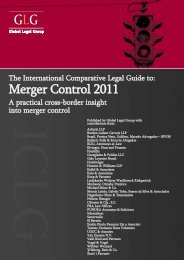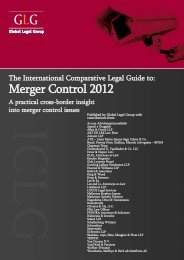Printable file (PDF) - Schoenherr
Printable file (PDF) - Schoenherr
Printable file (PDF) - Schoenherr
Create successful ePaper yourself
Turn your PDF publications into a flip-book with our unique Google optimized e-Paper software.
moldova<br />
Can the donor of the benefit show active repentance in order to<br />
abandon the offence and go without punishment? (e.g., if they<br />
report themselves to the authorities and prevent the anticipated<br />
act of the official) (Tätige Reue)<br />
Yes. The donor shall not be criminally liable if: (a) (i) they willingly and<br />
definitively abandon the offence; and (ii) the crime has not yet been<br />
committed; or (b) if the bribe was extorted; or (c) they willingly reported<br />
the crime to the authorities without knowing that the authorities<br />
are aware of the crime.<br />
What are the maximum sanctions for bribery in the public sector?<br />
Up to 15 years of imprisonment. Monetary fines and deprivation of<br />
the right to hold a specific function or to carry out certain commercial<br />
activities for a period of five years.<br />
2. Bribery in the private sector<br />
Active bribery: Is it an offence to bribe (i) employees, (ii) agents,<br />
or (iii) shareholders/owners of private companies with the intention<br />
that they act or omit to act contrary to their duties?<br />
Yes, regarding (i) and (ii) if the bribed person holds disposition powers/managing<br />
rights or the right to make economic-organisational<br />
decisions for a company or a public association. The bribe is passed<br />
with the intent that the person acts or omits to act in the bribe payer’s<br />
interest and such action is contrary to their duties. Regarding<br />
(iii), the situation would have to be assessed on a case-by-case<br />
basis.<br />
Active bribery: Is it an offence to bribe (i) employees, (ii) agents,<br />
or (iii) shareholders/owners of private companies with the intention<br />
that they act or omit to act in accordance with their duties?<br />
Yes, regarding (i) and (ii) if the bribed person holds disposition powers/managing<br />
rights or the right to make economic-organisational<br />
decisions for a company or a public association. The bribe is passed<br />
with the intent that the person acts or omits to act in the bribe payer’s<br />
interest and such action is in accordance with their duties. Regarding<br />
(iii), the situation would have to be assessed on a case-bycase<br />
basis.<br />
www.schoenherr.eu<br />
77








